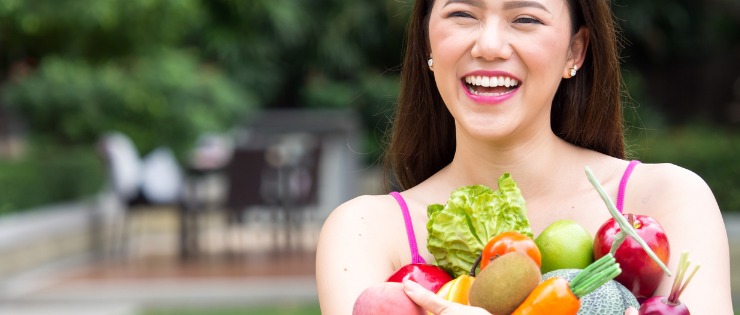
As our body ages we lose the ability to fight off the effect of free radicals. This can lead to accelerated signs of aging and the risk of developing a chronic disease. But does eating a diet high in antioxidants actually help fight the effects of free radicals? A healthy diet has many health benefits, but the research still isn't clear on the connection between diet and free radicals.
What are Free Radicals?
Free radicals are unstable atoms that have one or more unpaired electrons. They form when Oxygen molecules in the body split into individual unstable atoms, a process can cascade into a chain reaction. Too many free radicals in the body causes cellular damage and oxidative stress. Genetics and the environment influence how much damage free radicals cause individuals. Free radicals occur as part of normal biological processes in the body, particularly when you exercise and digest food to produce energy.
Free radicals circulating in the body are counteracted by antioxidants which scavenge or decompose them. But as the body ages it is less able to fight the effects of free radicals. Aging speeds up over time because of a build-up of free radicals. So more free radicals and oxidative stress damage cells contributing to aging and degenerative processes.
The impact of free radicals on aging and chronic disease has focused on the mitochondria, the tiny part of cells that process nutrients to power cells. Using oxygen, the mitochondria produce the energy and chemicals needed to break down waste and make cells die for growth and development. When cells don’t die, they can grow uncontrollably which may lead to a tumour.
Free radicals adversely alter lipids, proteins, and DNA which can trigger several diseases including atherosclerosis (the plaque on artery walls), cancer, inflammatory joint disease, asthma, diabetes, senile dementia and degenerative eye disease.
The free radical theory has existed since 1956. With free radicals blamed for aging and a variety of chronic diseases, it’s no surprise plenty of research has tried to isolate the genes responsible. The Genomics Institute of the Novartis Research Foundation (GNF) screened 635,000 small molecules to single out the few that blocked free radical production in the electron transport chain.

What are Antioxidants?
Antioxidants are molecules that prevent other molecules from oxidation. A stable antioxidant molecule can donate an electron to a free radical to neutralise and stop it causing damage. The body can scavenge some free radicals through normal metabolism but the majority need the helping hand of antioxidants.
The primary micronutrient antioxidants are vitamin E, C and beta-carotene. They can’t produced by the body so your diet is your body’s main source of these essential nutrients.
Vitamin E – a fat soluble vitamin that is found in a range of foods including nuts, vegetables, fish oil, whole grains, fortified cereals and apricots. A person doing an average amount of exercise has a recommended daily allowance (RDA) of 15 IU per day for men and 12 IU per day for women.
Vitamin C – a water soluble vitamin found in citrus fruit, capsicum, cabbage, spinach, broccoli, kale and strawberries. The RDA is 60 mg per day.
Beta-carotene – a precursor that is converted into vitamin A by the body. Beta-carotene is found in egg yolk, milk, carrots, spinach, broccoli, tomato, peaches and grains.
Excessive Exercise And Oxidative Damage
There’s a reason some marathon runners look older than their biological age. Endurance exercise requires maximal oxygen consumption (VO2max) - the highest rate at which oxygen can be taken in and consumed by the body. Breathing increases from 15 times per minute at rest to 40-60 times per minute while exercising which increases oxidative stress. Aerobic exercise has taken most of the bad rap but anaerobic exercise such as weight lifting is thought to produce similar amounts of oxidative damage.
While oxidative stress is fine, even beneficial in small amounts, data shows chronic oxidative stress may cause cellular damage. These damaged cells increase the risk of atherosclerosis, heart disease, cancer, dementia, and many other diseases.

Those most at risk of oxidative damage are people who suddenly increase their training volume. By gradually training up to endurance events, the body is better able to protect itself from permanent oxidative damage. Consistent training specific to the sport will increase antioxidant levels and decrease oxidative damage. By building up to high training loads and giving yourself adequate recovery periods, you can help protect your body against dangerous levels of oxidative stress.
Oxidative stress is believed to contribute to an increased risk of developing a number of diseases, including:
Heart disease
Alzheimer’s and other age related dementia diseases
Autoimmune and inflammatory disorders
Age-related eye problems including cataracts
Diabetes
Age-related appearance changes including grey hair, wrinkles and loss of skin elasticity
Degenerative genetic diseases including Huntington’s disease and Parkinson’s
Do Antioxidants Actually Prevent Disease?
Research has shown that people who eat a diet high in fruit and vegetables have lower rates of cancer and better health overall. The antioxidants in foods are thought to have a protective effect against free radicals causing oxidative damage.
While the link between eating a diet that is rich in vegetables and better health is clear, it is less clear if these health benefits are linked directly to antioxidants.
In fact, despite extensive research - including studies of hundreds of thousands of people - antioxidant supplements have not been found to prevent chronic diseases.
It’s a contentious topic and the precise effects of antioxidants are not yet fully understood. Following general medical advice to eat more fruit and vegetables will be better for your overall health, but taking expensive supplements to slow down the aging process can’t be clearly recommended at the moment.
Antioxidant Supplements Are Unproven
Recent research has found that high doses of antioxidant supplements don’t improve your chance of stopping free radical damage and may cause more harm than good.
In normal concentrations in the body, vitamin C and beta-carotene are beneficial antioxidants but by increasing their levels through supplementation they can actually become harmful pro-oxidants. Pro-oxidants are chemicals that induce oxidative stress or inhibit antioxidant systems. The long-term effect of taking high doses of antioxidant supplements are also unknown.
There may be some benefit to athletes from taking vitamin E to protect against oxidative damage. Vitamin E aids in the recovery process after exercise but the optimal level is unknown. For athletes not getting enough vitamin E in their diet, a supplement may be beneficial but it has not been conclusively proven.
In fact, taking high doses of some vitamins may actually be harmful. One study showed antioxidants gave smokers a slightly increased risk of lung cancer. Another study revealed that people taking supplements vitamin E and beta-carotene in doses higher than the RDA were at a significantly higher risk of dying.
Research has found some synthetic antioxidants to be dangerous to humans. There is a major difference between natural and synthetic antioxidants. When a natural antioxidant has donated an electron to a compromised molecule, it re-charges or recycles itself. With the synthetic form, the spent antioxidant becomes a harmful metabolic by-product which can add to the body’s oxidative stress, not reduce it. One research study recommended only natural forms of antioxidants. The most common synthetic antioxidants are butylated hydroxytoluene (BHT), butylated hydroxyanisole (BHA) and propylgallate.3.

Sources of Free Radicals
Some foods are a major source of free radicals and should be consumed moderately or not at all including:
High GI Foods
Avoid high glycemic foods like refined sugar and carbohydrates as they are likely to produce free radicals.
Processed Meats
Preservatives in sausages, bacon, ham and salami produce free radicals and have also been listed as carcinogenic.
Red Meat
Due to its high iron content, red meat is more likely to make a person vulnerable to oxidation.
Alcohol
Alcoholic drinks produce free radicals and are high in calories so limit to one or two drinks per day.
Cooking Oil
Discard leftover cooking oil so it isn’t reheated and used.
Other Sources of Free Radicals
Free radicals come with the metabolic process in the body and external sources including x-rays, smoking, chemicals, ozone and air pollutants, some drugs, and chemical pollutants.
Food Sources of Antioxidants
Research efforts have concentrated on finding natural compounds with anti-oxidative properties. Foods known to be very high in antioxidants include plums, raisins, blueberries, cranberries, beetroot, kale, spinach, red capsicum, figs, oranges and pomegranates.
Vegetables
Vegetables are one of the best sources of nutrients and antioxidants. Choose bright rich colours including red, purple, green and yellow and try to eat a variety of these colours every day. Those vegetables with B-carotene, lycopene and lutein are good sources of antioxidants such as alfalfa sprouts, spinach, sweet potatoes, corn, red cabbage and tomatoes. Incorporate vegetables into your lunch and snacks as well as dinner to ensure you are eating at least five different serves per day.
Fruit
Swap out processed snack foods for fresh fruit. Eat a rainbow of colour so you get a good mix of vitamins. Cranberries are particularly high in antioxidants.
Nuts
Nuts are nutrient-dense plant foods that offer a powerful nutrient punch. The antioxidant standout is the walnut because it contains almost double the amount of antioxidants found in all other tree and ground nuts. They are also the richest nutin omega-3 fatty acids which fight inflammation and lower the risk of chronic disease. Enjoy nuts raw or roasted as roasting was found to have little effect on free or total polyphenols in nuts.

Legumes
Beans – red, kidney, black and pinto – are good sources of antioxidants so try to include them in as many meals as possible.
Herbs
Herbs and spices not only add flavour to our food but some can reduce oxidative stress in our bodies. Try to include ginkgo, rosemary, turmeric, ginger and grape seed extract.
Green Tea
The polyphenols in a cup of green tea can combat oxidation. By weight, green tea is around 30 percent polyphenols including a catechin called EGCG which are natural antioxidants.
Cocoa
If you enjoy chocolate, you’re in luck. Add cocoa to your sweet baking to give it an antioxidant boost or buy a block of dark chocolate with a high percentage of cocoa, at least 70%, to snack on.
Indian Diet
Researchers have identified the Indian diet as having high levels of antioxidants. Foods and spices include garlic, onion, mustard, red chilies, turmeric, clove, cinnamon, saffron, curry leaf, fenugreek, and ginger.Indians also use botanicals to treat disease.
Recommendations
It’s impossible to avoid free radicals. Your body will eradicate some free radicals but it relies on your foods to supply antioxidants as a helping hand to keep others at bay. Do your part by following these simple recommendations:
Eat 2 serves of fruit and 5 serves of vegetables every day
A diet high in vegetables has many health benefits but the benefits can’t be conclusively linked to antioxidants in the vegetables
Don’t start intense exercise without building up to it to avoid permanent oxidative stress
Engage in a regular exercise program
Consider taking a vitamin E supplement if you are an endurance athlete
Don’t take antioxidant vitamins if you have cancer or have a family history of cancer
Don’t consider taking a synthetic antioxidant
Don’t exceed the RDA of any antioxidant supplements, particularly if you aren’t exercising excessively
Look out for news from credible scientific sources because research into the health effects of free radicals and antioxidants is ongoing